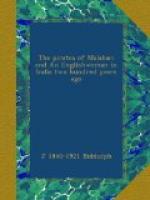The Europeans in Toolajee’s service appear to have left him before the attack began, as no mention is made of them; but ten Englishmen and three Dutchmen were found in the place, in a state of slavery, and released.
In delivering over Bankote, the Mahrattas had failed to give, with the fort, the five villages according to agreement. The Council were desirous of having Toolajee in their own keeping, so they refused to give over Gheriah, and for some months a wrangle went on concerning the points in dispute. The Council proposed that they should retain Gheriah and give up Bankote. The Peishwa taunted the Council with breach of faith, and refused to give up Toolajee. The squabble was at last settled by the Mahrattas engaging to give ten villages near Bankote, and that Toolajee should not receive any territory within forty miles of the sea. On these conditions Gheriah was delivered over. Toolajee, instead of being given any territory, was kept a prisoner for the rest of his life. Some years afterwards, his sons made their escape, and sought refuge in Bombay.
With the fall of Gheriah, the heavy cloud that had so long hung over Bombay trade was dispelled. Thenceforward none but the smallest vessels had anything to fear on the coast south of Bombay, though another half-century elapsed before the Malwans were compelled to give up piracy. The Sanganians continued to be troublesome, at times, till they too were finally reduced to order in 1816, after more than one expedition had been sent against them. Persian Gulf piracy continued to flourish till 1835, when it was brought to an end by a happy combination of arms and diplomacy.
On Shooter’s Hill, adjoining Woolwich Common, the tower of Severndroog, erected by James’s widow to commemorate his great achievement, forms a conspicuous landmark in the surrounding country. Here, in sight of the spot where the bones of Kidd and his associates long hung in chains as a terror to evil-doers, there still lingers a breath of that long struggle against the Angrian pirates, and of its triumphant conclusion.
“This far-seen monumental
tow’r
Records the achievements of
the brave,
And Angria’s subjugated
pow’r,
Who plundered on the Eastern
wave.”
"Walks through London,” David Hughson.
[1] Properly Suvarna Droog, ‘the Golden Fortress.’
[2] Bankote was made over on the 6th December, and
the British flag
hoisted there on the 10th
January, 1756.




